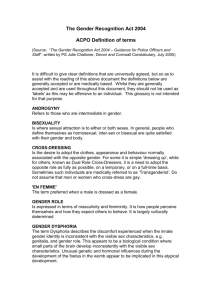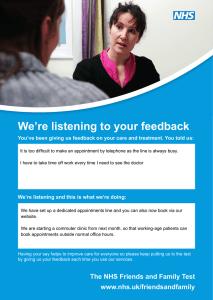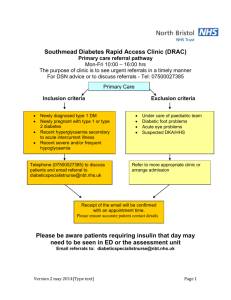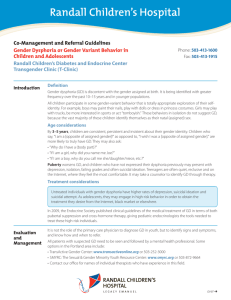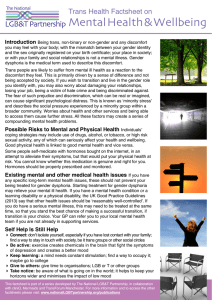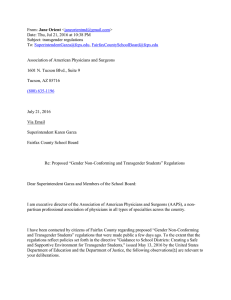Trans Children, Teens & their Parents LGB&T Partnership Trans Health Factsheet on
advertisement
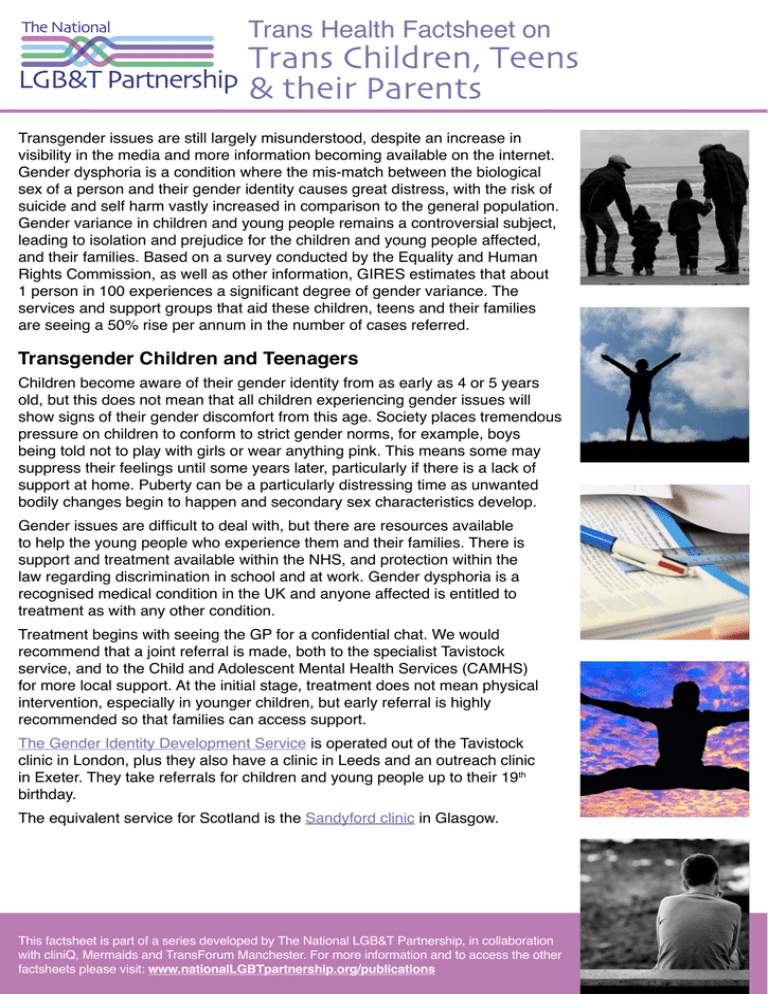
The National Trans Health Factsheet on Trans Children, Teens LGB&T Partnership & their Parents Transgender issues are still largely misunderstood, despite an increase in visibility in the media and more information becoming available on the internet. Gender dysphoria is a condition where the mis-match between the biological sex of a person and their gender identity causes great distress, with the risk of suicide and self harm vastly increased in comparison to the general population. Gender variance in children and young people remains a controversial subject, leading to isolation and prejudice for the children and young people affected, and their families. Based on a survey conducted by the Equality and Human Rights Commission, as well as other information, GIRES estimates that about 1 person in 100 experiences a significant degree of gender variance. The services and support groups that aid these children, teens and their families are seeing a 50% rise per annum in the number of cases referred. Transgender Children and Teenagers Children become aware of their gender identity from as early as 4 or 5 years old, but this does not mean that all children experiencing gender issues will show signs of their gender discomfort from this age. Society places tremendous pressure on children to conform to strict gender norms, for example, boys being told not to play with girls or wear anything pink. This means some may suppress their feelings until some years later, particularly if there is a lack of support at home. Puberty can be a particularly distressing time as unwanted bodily changes begin to happen and secondary sex characteristics develop. Gender issues are difficult to deal with, but there are resources available to help the young people who experience them and their families. There is support and treatment available within the NHS, and protection within the law regarding discrimination in school and at work. Gender dysphoria is a recognised medical condition in the UK and anyone affected is entitled to treatment as with any other condition. Treatment begins with seeing the GP for a confidential chat. We would recommend that a joint referral is made, both to the specialist Tavistock service, and to the Child and Adolescent Mental Health Services (CAMHS) for more local support. At the initial stage, treatment does not mean physical intervention, especially in younger children, but early referral is highly recommended so that families can access support. The Gender Identity Development Service is operated out of the Tavistock clinic in London, plus they also have a clinic in Leeds and an outreach clinic in Exeter. They take referrals for children and young people up to their 19th birthday. The equivalent service for Scotland is the Sandyford clinic in Glasgow. This factsheet is part of a series developed by The National LGB&T Partnership, in collaboration with cliniQ, Mermaids and TransForum Manchester. For more information and to access the other factsheets please visit: www.nationalLGBTpartnership.org/publications Trans Health Factsheet on Trans Children, Teens & their Parents Useful Links The NHS has a page on Gender Dysphoria here: www.nhs.uk/conditions/Gender-dysphoria/Pages/Introduction.aspx Mermaids, a UK charity offers support to transgender teens and parents of transgender children. www.mermaidsuk.org.uk The Gender Identity Research and Education Society (GIRES) has extensive information on its website: www.gires.org.uk A directory of other support groups is available at: www.Tranzwiki.net Parents of Transgender Children Supporting a child who is experiencing gender dysphoria is challenging, not least because the outcome is uncertain, especially for very young children. But even if it is a phase, it can be a very distressing and difficult time, and could last for many years. In children who experience gender dysphoria in puberty, It is quite likely to continue. Even then, it may not result in a complete change of gender role. The young person may feel most comfortable in a role that is not entirely girl/woman or boy/man or even live as a non gender person. The term that these young people have adopted to describe themselves is non-binary. This site is helpful: Understanding Children’s Atypical Gender Behaviour These online resources can be very useful. The first is to be used by all the professionals who care for young people, as well as by their families. The second is aimed directly at GPs. www.nlmscontent.nesc.nhs.uk/sabp/gv www.elearning.rcgp.org.uk/gendervariance (from early 2015) The NHS Tavistock clinic will assess the child/young person, and then, in conjunction with the family, (if appropriate and dependent upon the stage of pubertal development), the options will be discussed. In a child approaching puberty, the option of hypothalamic blockers will be considered. This completely reversible intervention suspends puberty and will only be prescribed if the feelings of gender dysphoria worsened at the onset of puberty. In young people referred to the clinic who are already experiencing pubertal development, they will be prescribed the blocking medication after the initial assessments are completed. This ‘pause’, then allows the young person to consider their future without the distress of having their body develop in conflict with their personal gender identity. Cross sex hormones, to masculinise or feminise the young person to match their gender identity, may be prescribed at 16, if the young person does not change their mind during this period, which is rare for those receiving the blocking medication. The law protects the privacy of gender nonconforming young and also protects them against discrimination, regardless of any medical treatment they may have. For more information, go to: www.gov.uk/discrimination-your-rights/types-of-discrimination Human Rights Act The Data Protection Act The National LGB&T Partnership This factsheet is part of a series developed by The National LGB&T Partnership, in collaboration with cliniQ, Mermaids and TransForum Manchester. For more information and to access the other factsheets please visit: www.nationalLGBTpartnership.org/publications
